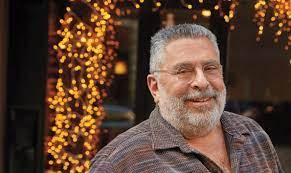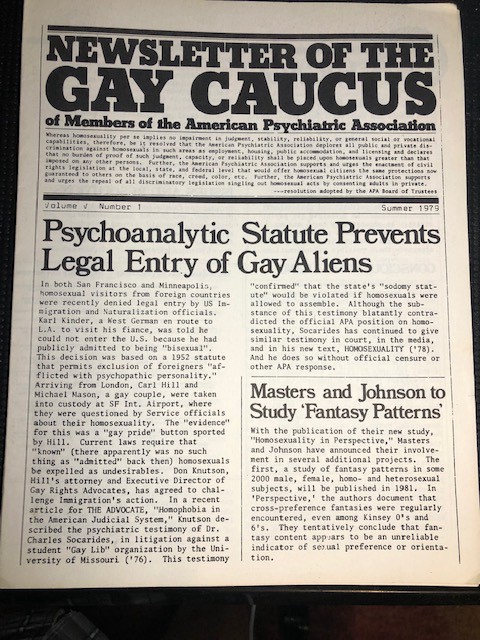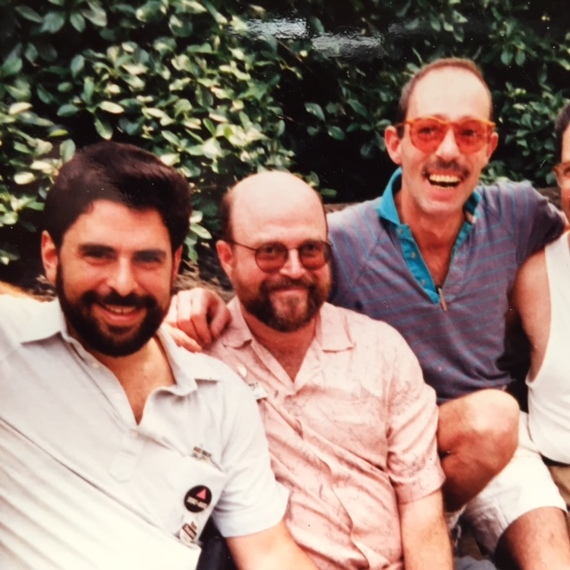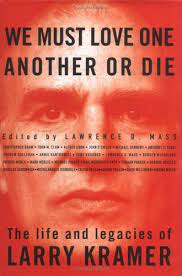Firstly, I really want to apologize for the lack of articles this month (Pride month of all months!), my job has been insanely busy lately and, unfortunately — I’m sure you’ve all noticed and are probably upset by this too — queer people still have to work in June. So, while I was really trying to get this post up three weeks ago….I’m doing the best I can right now. (And honestly, this could have — maybe should have — been a lot longer but…life is getting in my way.)

Anyways, you all probably noticed earlier this month a lot of attention being paid to the 40th anniversary of the official beginning of the AIDS crisis in the United States. And while its certainly true that June 5th was when the CDC published its first report, it wasn’t the first time the growing epidemic had been publicly written about. Dr. Lawrence D. Mass had covered it nearly a month earlier.
Lawrence D. Mass was born in Macon, Georgia on June 11, 1946. I can’t really find anything about his childhood, so I assume it was pretty uneventful — which is pretty good considering he was growing up gay and Jewish in Georgia in the late 1940’s and 50’s. He graduated from the University of California at Berkley in 1969 with a B.A. and then attended the Abraham Lincoln School of Medicine at the University of Illinois, graduating with his M.D. in 1973. Following that, in association with Harvard Medical School, he completed a residency in anesthesiology at Massachusetts General Hospital in Boston.
In 1973, the American Psychiatry Association changed its classification of homosexuality, so it was no longer considered a mental illness. Unfortunately, that didn’t change the homophobia of many of the people practicing psychiatry at the time. Mass went up for a residency in psychiatry in Chicago, but mentioned in the interview that he was gay — and the response was, well, not good. It was the first of multiple interviews over several years where this happened. So Mass changed his whole career trajectory — he moved into activism and journalism. (And, not to be grateful for a bunch of homophobic jerks in Chicago or anything, but that turns out to have been a good thing for all of us.)

With homosexuality’s declassification as a mental illness, that did mean that gay practitioners could come out of the closet. Before long, the Gay Caucus of Members of the American Psychiatric Association was formed (now called the Caucus of Lesbian, Gay, Bisexual, Transgender & Questioning/Queer Psychiatrists.) Lawrence Mass became the editor of their newsletter. He was not afraid to feature politically charged articles in that newsletter — the first issue featured the article “Psychoanalytic Statute Prevents Legal Entry of Gay Aliens,” which exposed public policies that relied on out of date theories for justification. At the same time, he began contributing to a number of newspapers and magazines catering to the LGBTQIA+ community — using his expertise in medical fields to better inform his writing. His first piece was published in Boston’s Gay Community News.
Using his medical background and his insight into the American Psychiatric Association (through the caucus), Mass became — as he would put it — “a chronicler of a critical shift in scientific thinking about sexuality.” But he wasn’t just looking at how psychiatry was viewing homosexuality, he was watching shifts in a whole bunch of fields — not just medical science, but social science and political science. He interviewed a lot of leaders in the shift occurring across numerous fields of research, including Judd Marmor, Mary Calderone, John Boswell, Martin Duberman, and many others. Most of these interviews would go on to be compiled in his Dialogues of the Sexual Revolution collections. They provide important insight into the major cultural shift that was taking place in the USA in the decade following the Stonewall Uprising.
Mass also brought his medical background to discussions about sexual health in the gay community during the 1970’s in these same publications, covering the spread of STDs and even topics concerning fetish and kink — like 1979’s “Coming to Grips With Sado-Masochism” in The Advocate.
After a few years of that, it’s little wonder that rumors about an unusual illness afflicting gay men were brought to him. His best efforts to investigate met with little success — he’d talked to a friend who worked in a New York City emergency room, and learned of eleven cases (albeit only five or six of the patients were gay men). While that was promising, both the New York State Health Department and the Center for Disease Control assured him the rumors he was pursuing were baseless. Though he didn’t have all the information he was looking for, Mass went to print — hoping that laying out the facts as he had learned them would help keep his community informed and keep the rumors from starting any kind of panic. On May 18, 1981 his article “Disease Rumors Largely Unfounded” appeared in the pages of The New York Native which was, at the time, the most influential gay newspaper in the country. Although no one knew it at the time, it was the first published document about AIDS (at least in the US — though I haven’t found anything published earlier anywhere else either). The story would get picked up by the L.A. Times in June, with hardly any more answers that Mass had already gotten (as the L.A. Times article was published the same day as the CDC’s report.)
Mass’ article stressed that there was no reason to believe that whatever was (or was not happening) was linked to the gay community. One theory put forth in his research was that it was a new virulent strain of a fairly common microscopic organism, and such a thing obviously wouldn’t be tied to just one community. As Mass continued to publish articles as the epidemic unfolded, he stood by this — it was not a gay illness. While it certainly had a profound impact on the gay community, it’s true that we were not the only ones afflicted. Diseases don’t discriminate, and Mass was well aware of that.

By 1982, it was becoming increasingly clear as HIV/AIDS was found in more people than just gay men. Nevertheless, he joined Larry Kramer, Edmund White, Paul Rapoport, Paul Popham, and Nathan Fain in formally founding Gay Men’s Health Crisis (or GMHC) he was the last hold out on the organization’s name — insisting it was not a gay disease. He was overruled, something for which he later said he was grateful because the name works for the organization, even if it isn’t just a gay man’s disease. To this day GMHC remains one of the biggest and most important AIDS organizations in the world. Mass wrote all four editions of GMHC’s Medical Answers About AIDS.
Mass committed himself to providing up to date and accurate information about the AIDS epidemic and combatting AIDS denialism, but early in his research he was confronted with an incident of overt anti-Semitism — the first he’d experienced as an adult. The event was traumatic, and led him to realize that he’d been surrounded by anti-Semitism his whole life, and even internalized a lot of it. Ultimately, this led to his publishing an autobiographical collection of essays in 1994, entitled Confessions of a Jewish Wagnerite. (“Wagnerite” because Mass was a big fan of Wilhelm Richard Wagner, the German composer. As Mass began to broach more subjects in his writing during the 90’s, his love of music became one of his chosen topics.)

The years of research into anti-Semitism helped give Mass a unique insight into the subject of his next major publication: We Must Love One Another or Die: The Life and Legacy of Larry Kramer, published in 1997. Mass was an editor for the book, taking contributions from notables like Anthony Fauci and Tony Kushner, but his own contribution — at the beginning of the book and entitled “Larry vs. Larry” — details a tumultuous friendship, but also recalls how inspiring Mass found Kramer’s personal voice in his writing was.
About that time, the late 90’s, Mass also found himself writing regular articles for gay publications about public health issues facing the gay community other than HIV/AIDS — crystal meth addiction, anal cancer. As the decade came to a close, he began writing specifically regarding bear subculture, publishing articles in American Bear Magazine and in A Bear’s Life Magazine.
Much of Lawrence Mass’ work has been collected and archived by the New York Public Library. That said, Mass is still listed as a contributor on the Huffington Post, but all of his most recent writings have been on Medium. He is presently living in New York City with his partner, activist Arnie Kantrowitz. Sounds like a happy ending, and after everything he (and Arnie, but that’s another story) have done for our community, I think that’s very well deserved.